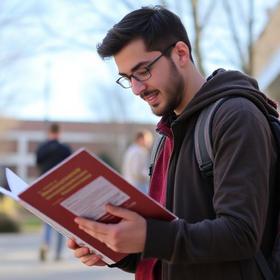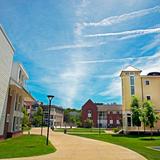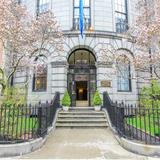- Founded in 1961, MassBay is one of 15 accredited Community Colleges within the Commonwealth of Massachusetts' Public Higher Education System. Our goal is to prepare you to transfer to a four-year institution, enter the job market in high demand fields, retrain you for new job opportunities and provide exciting lifelong learning selections.
School Highlights
Massachusetts Bay Community College serves 6,161 students (21% of students are full-time).
The college's student-teacher ratio of 17:1 is higher than the state community college average of 12:1.
Minority enrollment is 56% of the student body (majority Hispanic), which is less than the state average of 57%.
Quick Facts (2025-26)
- Enrollment: 6,161 students
- In-state tuition: $4,176
- Out-state tuition: $9,120
- Student-teacher ratio: 17:1
- Minority enrollment: 56%
- Source: Integrated Postsecondary Education Data System (IPEDS)
Top Rankings
Massachusetts Bay Community College ranks among the top 20% of public schools in Massachusetts for:
Category
Attribute
Affordability
Diversity
Debt For Students
School Overview
The teacher population of 356 teachers has stayed relatively flat over five years.
Massachusetts Bay Community College
(MA) Community College Avg.
Carnegie Classification
Associate's Colleges: Mixed Transfer/Career & Technical-High Nontraditional
Associate's Colleges: Mixed Transfer/Career & Technical-Mixed Traditional/Nontraditional
Institution Level
At least 2 but less than 4 years
At least 2 but less than 4 years
Institution Control
Public
Public
Total Faculty
356 staff
290 staff
School Calendar
Student Body
The student population of Massachusetts Bay Community College has grown by 52% over five years.
The student-teacher ratio of 17:1 has increased from 11:1 over five years.
The Massachusetts Bay Community College diversity score of 0.73 is less than the state average of 0.74. The school's diversity has stayed relatively flat over five years.
Total Enrollment
6,161 students
2,687 students
Student-Teacher Ratio
17:1
12:1
# Full-Time Students
1,304 students
1,039 students
# Part-Time Students
4,857 students
1,648 students
# Enrollment Undergraduate
616 students
278 students
# Full-Time Undergraduate Students
1,304 students
839 students
# Full-Time Graduate Students
n/a
217 students
# Part-Time Undergraduate Students
4,857 students
1,619 students
# Part-Time Graduate Students
n/a
346 students
Total Dormitory Capacity
n/a
400 students
% American Indian/Alaskan
n/a
n/a
% Asian
6%
6%
% Hispanic
20%
21%
% Black
12%
15%
% White
44%
43%
% Hawaiian
n/a
1%
% Two or more races
3%
3%
% Non Resident races
2%
2%
% Unknown races
13%
9%
Diversity Score
0.73
0.74
College Completion Rate (Students who graduate in less than 4 years)
18%
21%
College Completion Rate (Students who graduate in 4 years or more than 4 years)
n/a
45%
Average Graduate Earnings (10 Years)
$42,200
$35,500
Tuition and Acceptance Rate
The public in-state tuition of $4,176 is less than the state average of $4,424. The in-state tuition has declined by 22% over four years.
The public out-state tuition of $9,120 is less than the state average of $9,401. The out-state tuition has declined by 11% over four years.
In-State Tuition Fees
$4,176
$4,424
Out-State Tuition Fees
$9,120
$9,401
% Students Receiving Some Financial Aid
74%
87%
Median Debt for Graduates
$6,696
$11,249
Median Debt for Dropouts
$3,608
$5,500
Acceptance Rate
n/a
75%
SAT Reading
n/a
540
SAT Math
n/a
535
SAT Writing
n/a
480
ACT Composite
n/a
21
Source: 2024 (or latest year available) Integrated Postsecondary Education Data System (IPEDS)
School Notes
- Massachusetts Bay Community College (MassBay) is an accredited two-year public college with campuses in Wellesley and Framingham, and a Technology Center in Ashland. Earn your Associate Degree, Certificate, or choose non-credit professional and continuing education programs. We feature small class sizes for more personalized attention and an individualized learning environment and a dedicated team of professors focused on helping each of their students succeed and accomplish their educational goals. Many of our professors teach at other prestigious Boston-area institutions, have published works in their particular field, or have won awards for their accomplishments. Centers of Excellence that allow you to study and interact among peers with similar career goals. Resources, like part-time, evening, Saturday and online classes, to make it easier for you to fit college into your lifestyle. We provide quality career programs for immediate employment and programs paralleling the first two years of a Bachelor's Degree. MassBay offers a diverse course selection in the Liberal Arts, Science and Engineering, Computers, and Health Sciences programs of study. Student Activities are the other side of college life, the extracurricular activities outside of the classroom. In addition to attending and participating in events, you can join a club or organization that plans the events or run for an elected position and tackle some campus issues. Student clubs at Mass Bay include everything from Student Government, to cultural groups to honorary societies and academic groups. Taking a leadership role in any of these groups offers you the opportunity to learn many skills. You can learn how to budget money, implement and evaluate projects and programs, manage and resolve conflict, communicate publicly, develop critical thinking skills, improve interpersonal skills, develop an ability to work in groups of diverse individuals, reflect on your professional abilities, understand community responsibility and most importantly, have FUN!
Frequently Asked Questions
How much does Massachusetts Bay Community College cost?
Massachusetts Bay Community College's tuition is approximately $4,176 for In-State students and $9,120 for Out-State students.
What is Massachusetts Bay Community College's ranking?
Massachusetts Bay Community College ranks among the top 20% of community college in Massachusetts for: Least expensive tuition, Diversity in US community colleges and Least debt for graduating students.
Recent Articles

How to Transfer from Community College to a Four-Year University in 2025
A step-by-step guide for community college students transferring to a four-year university in 2025 — updated strategies, data and expert insights.

Scholarships for Community College Students 2025
Explore updated scholarship programs, tuition data, and expert strategies for community college students in 2025.

The Rise of Technical and Vocational Training in 2025
Explore the 2025 surge in technical and vocational training—enrollment, policy, costs, and why this path is gaining ground for students and parents.











